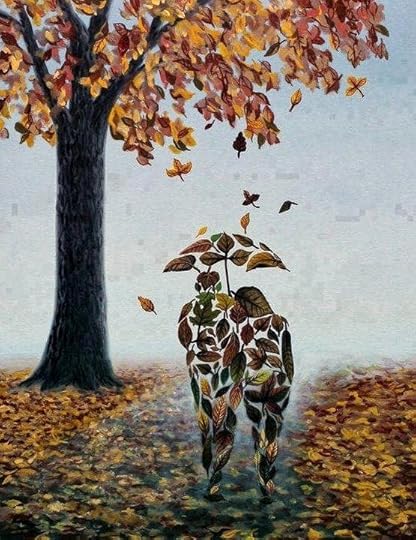David Teachout's Blog, page 21
March 7, 2014
"I Am" As Construct Not Director

A new experience beckons, we look forward with trepidation and at times alarm or eager anticipation and always with the mentality that "I' will select the behavior best suited to highlight how incredible we simply know we are. On the other side of the experience, frustration ensues at why we didn't say just that very thing we now know we should have, why we behaved in just the wrong way and how clearly the impression left was one of misfit rather than one inspiring social esteem. Does this sound at all familiar? Simpler examples abound. That moment when we find ourselves saying or doing things we didn't think we'd do or even swore we wouldn't; those social faux paus's like a gaseous expulsion at a funeral.
Yet with all of these instances of social lack of control, we rarely find ourselves burdened by doubt concerning the seamless quality of our lives. Our internal narratives string along event after event into a wrinkle-less whole, rationalizing and justifying every instance of "good" and "bad" behavior, offering up on a platter of literary brilliance the holism of our lives. This holistic feel allows for notions of authenticity, where a person adheres to their “real” or “core” self; this feel also allows for judgment, legal and moral, when a behavior is noted as being outside social standards or that favorite of political pundits, hypocrisy; that feel provides continuity to our lives, as we are able to look back and get a sense of both where we came from, where we currently are and project into the future the fantasies of where we’d like to be.
This sense of being-ness, the psychological root of metaphysics, is not without difficulty. As noted above there are moments when we find ourselves doing or having done something that didn’t “feel” like ourselves, where we offer declarations of “this isn’t what I wanted to do.” Yet there exists a niggling doubt, a thread of anxiety concerning whether we did in fact “want” to do that very thing. Unless at that moment we are willing to believe an external agency took our bodies over and manipulated our actions, then the only person in charge was “I.”
Note here the existence of a separation of two influences and their location. When we discuss matters of free will we often talk as if the “I” is an external being, picking and choosing among disparate actions, uninfluenced by so-called physical variables. However, when something occurs for which we feel a disconnect or dissociation we then inquire as if the “I” is an internal being that was overpowered by external variables. Perspective shifts the location of the “I,” and this occurs without a pause in our collective considerations for the repercussions.
Let’s look at this differently. Bring to mind a person who, upon imbibing a chemical substance, whether of the social lubricating variety or of the blindly-accepted pharmacological variety, behaves differently. Often the situation is narrated as the person feeling “true” or connected with “who they really are.” Leaving aside that an external variable, the chemical, shifted dramatically what was supposedly an external and non-contextual “I,” think for a moment what those changes have manifested in interconnected relationships. If the previous set of behavior had continued, there’d have been reactions to it that are different than the reactions to the behavior post-chemical, precisely because they’re different. This would have resulted in a different relationship dynamic, offering up a different space for the manifestation of different behavior and so on. More simply, imagine for a moment what would happen if you acted the exact same way at home as you did at work, or at work the exact same way as out with friends. The repercussions are legion and fundamentally the only difference between a chemical and a variation in social situation, is the verbiage in description. They are both simply variables in the singularity that is reality. One is not more or less natural than the other, one is not fundamentally any different in kind. Yet, the story told of the pharmacology is that we find our “true” self and when alcohol is involved we tell the story that it was like being someone else.
Pause for a moment and consider each and every variable as equal to one another, not necessarily in strength but in kind. Familial background, genetic history, social class and the accompanying philosophies, these and many others all have variations in strength concerning influence on any life but are still fundamentally variables as such. With this in mind, begin taking away one of them at a time, starting small with a single social connection like the bus-driver who helps you get to work and then progressively bigger variables. See the ripples each one disappearing has on the story you create.
As Bruce Hood, in The Self Illusion: How the Social Brain Creates Reality, states: "You only exist as a pattern made up of all the others things in your life that shape you. If you take each away, “you” would eventually cease to exist. This does not mean that you do not exist at all, but rather that you exist as a combination of all the others who complete your sense of self. These are the memories and experiences that shape you. The problem, as we have seen, however, is that these memories are not always that reliable and so the self that is constructed is not necessarily an accurate or consistent version.”
See what has happened here. When it is noted first that ego is a point of reference, we can see why perspective will shift the location of that very ego or “I.” When it is further noted that each and every variable is fundamentally of the same kind in a singular universe, then that “I” ceases to be an external director selecting potential actions to complete. Instead, the “I” is an internal construction, a locus at the intersection of a virtually infinite set of variables, all coalescing into a seemingly seamless self-narrative because it is the story that is being consciously held not the variables separately themselves.
The power of perspective, of conscious intention and attention, is bound in this realization: the self is a construct, one that is constantly evolving. Like offshoots in a genetic line that may find ground to grow and others die off, so the self has its own tendrils, manifesting as behavior we either declare is in line with the “true” or something other. Confusion here results only if the “self” is a director. If considered as a construct, no less powerful or meaningful, then everything we do is us and the potential for change is as enormous as there are variables in the universe. When we contemplate our stories and find ourselves in a moment of self-castigation or doubt or shame or judgment upon others, remembering the ebb and flow of that construct of variables brings both freedom and an increase in empathic understanding.
© David Teachout
February 19, 2014
A Foundation Of Relationships

Determining whether one is "in" a relationship seems like a culturally constructed form of self-torture. When a teenager it was all anyone wanted to know, from the moment words escaped one's mouth in close proximity to someone else of which some form of interest could be projectively identified. Lest anyone think such antics are grown out of, the adult world is filled with opportunities to ask the question, albeit in ways that are at times more subtle, but no less personally invasive. There's an entire holiday devoted to anxiety-filled, wallet-destroying, emotionally-pressured declarations of being "in" a relationship. This latter is felt to be so pernicious by some that the overt denial of it with various forms of vitriol and declarations of its historical inauthenticity has become its own powerful meme, a status symbol in its own right as a counter-culture badge.
While clearly the nature of the question is obsessively focused on a particular form of relationship, that of the romantic, this myopic dedication hides a broader reality: we all, every one of us, are in a relationship each and every moment of every day for the entirety of our lives. Further, not only are we in relationship, the very nature of our being is such that there would be no "I" without that foundation of relationship. This truly cannot be overstated and the power of it is easily overlooked due to its unconscious acceptance. Our relational reality is like gravity, so pervasive, so utterly necessary for life as we know it, that the sheer enormity of it is hidden from us even as it guides and pulls every manifestation of our behavior. In fact, our brains seem to be hard-wired to conceal this metaphysical reality through the narrative construction of a central "I."
Like figuring out a magician's trick, seeing the truth here requires directing one's attention away from what is flashy. We tell stories and the "I" of our narratives, what we conceptualize as ourselves, moves along as the fulcrum of whatever is occurring. While much is said about narcissism being harmful and dismissive of others, there is a baseline quality to our developing narratives that is inevitably this very thing. One of the reasons why we're so terrible at making rational decisions, particularly as it relates to statistical analysis, is we can't remove the ego-focus from which all thinking is directed.
Psychologists call these patterns heuristics, models of thinking that guide the formation of our narratives from amidst the gluttony of facts constantly impinging upon us. In the year after the attacks in the United States of 9/11, people in fear for their lives over possible airplane attacks took to the streets in their vehicles. This infusion of steel-encased fear resulted in a statistical uptick of traffic deaths above the average that actually was six times more than the number of those who died in the planes in the attack. The "example rule" heuristic, that situations are more prevalent if they can be immediately recalled, here resulted in needless suffering and yet not a single person thought at the time they were acting in anything other than their best interests. The grand "I" hiding from a world of interconnection was triumphant.
Not nearly so melodramatic, further examples abound in our everyday lives. Every wrong turn, miscommunication, dismissal of another's behavior as being emotionalistic or foolish, disregard for another's suffering through addiction, loss and anxiety, are all predicated upon the belief in the "I" of the billiard ball being directed as the consciousness of the cue-stick. In each instance there is a lapse in the acknowledgment of our relational foundations. That it happens so often only helps hide the deeper reality further. As a person in a desert, the notion of there being water underneath his feet is flung aside with every chapped breath.
Ponder for a moment, utilizing the focusing power of our consciousness, how each and every thing we do and think is tied to a virtually infinite number of variables. Every thought that rises to consciousness is itself a result of underlying unconscious connections, neurons working in parallel making connections with one another in patterns utterly stunning in their complexity. The very ability for you to be reading this requires a sea of technological, social, biological and cultural components coming together in just such a way to provide the space for you to narcissistically believe the story of your life flows only through you. In so doing, we miss that the story could not, would not, ever be possible without the thousands of millions of people stretching out into the socio-genetic panorama of human civilization.
Every day we are "in" relationship. Every moment of our lives we are "in" connection with those seen and unseen. No breath we take, no action we call our own, no thought or emotion we experience, is separate from the nearly infinite interlocking lattice-work of our relational reality. We may need the "I" to tell our stories, but let us reaffirm in conscious appraisal the enormity of the ripples coalescing into and spreading again out from each one of us.
© David Teachout
February 13, 2014
Ego Is A Point Of Reference, Not A State Of Being

Grounding one's contemplation of experience on the foundation of relational being-ness leads to an inescapable point of recognition, an acknowledgment that how we talk about our experiences, particularly how we talk about people, is not accurate. Recently I noted in a discussion about personality disorders that so much of the language was concerned with the person as a being cut off from their context, as if the therapist could interact with the client in an "I and you" space. My comment then and now was to bring up the inter-relational reality that is not just a descriptive of our behavioral interactions, but a foundational principle of our existence.
We are so caught up in the seemingly intuitive notion that we are all billiard balls of individual egos, bouncing off of one another in the cacophony that is society, we never stop to look at how this idea utterly fails in providing a truly nuanced and honest appraisal of our existence. The simple fact of the matter is, the individual ego is not a state of being, it's a referential locus, like the fulcrum of a teeter-totter, important and what is often keenly felt in awareness but completely inadequate to fully understand the whole of our experience.
In discussing the so-called mind/body problem, Leonard Peikoff notes: "Mind is consciousness; consciousness is nothing but the faculty of perceiving that which exists; so if you grasp the relationship of consciousness to existence, that would obliterate the whole idea that there's some kind of war between the two." ("Understanding Objectivism") I use this quote not to draw commonality between myself and objectivism, as there are many dissimilar ideas, but to point out a rare proper conflation, that of mind and consciousness as a perceptual tool. Further, in bringing up the mind/body problem, I am directing attention to how a misunderstanding of ego leads to a faulty conceptual understanding of who we are and perpetuates the feeling of separation that is at the heart of shame and doubt.
Let me break that down further. When conversing about people and ourselves, there's almost always at the core of it a desire for understanding the why and how of a particular action. We become prophetic armchair philosophers and psychologists, pedantically excoriating the behavior of others and/or ourselves, exclaiming "how could she?!" or "but that just isn't the real me!" with varying degrees of emotional hysteria depending on the consequences and emotional bonds involved. In either case, the entirety of the analysis is based on a feeling of separation, whether that be between us and the other or between the "ideal I" and the "actual I" of our personal narrative. The separation between people, or between our mind's "I" and our body's behavior, leads to shame over our actions or projected judgment about another's, coating the entirety of the situation in a miasma of unfortunate and needlessly painful recrimination.
I say needless because once we remove the notion of our egos as states of being or of actors engaging with the universe in a game of chess, replacing it with the idea of our egos being like pinpricks upon the canvas of potential experience, any self-recrimination and hate-filled judgment of others becomes not only irrational but also unhelpful, if not outright unethical. When we take stock of how we live, when we truly pay attention, the feeling of being in control is just that, a feeling, a phenomenological experience that we take for being intrinsic to humanity, something that is deeply and profoundly tied to a sense of self. Stepping back but a little we can immediately see the countless variables required to be in place for any particular behavior to come about. Making the situation more complicated, much in the same way that different neural maps can result in the same behavior, so changes in environmental variables can still result in the same behavior manifesting. Yet, just as in neurology, this in no way removes the requirement that the behavior in question needed, and was a direct result of, the context provided by all those variables.
Without going any further, what is immediately noticeable here is how profound the effect of a single principle can have in the framing of our experience. If we are billiard-ball egos, then dialogue becomes combat and judgment becomes about separating us from them. If we are bound in a singular reality, our egos simply keyholes to view a select section of possibility, then understanding another person becomes about compassion and empathy and recriminations are replaced with thoughtful determination to shift what needs to be shifted to provide the impetus to behave differently next time.
In a relational universe of perceiving egos we open ourselves to a shared living.
© David Teachout
February 5, 2014
Subjectivity Perceives, It Does Not Create

Tell me a story. A short one. A simple one. One where you go about your normal day. A reflective narrative if you will, but one that is told as if it is happening to another person, despite it being entirely about you. When done, notice for a moment what the content of that process involved. Was there anything unnatural or out of the ordinary? Did something pop into the story that had no connection to the context in which the person was living? Were words used that had no meaning or were unrecognizable?
Now tell the same story again, but this time add in something fantastical, something that didn't happen and has no immediate connection to the context. A dragon soars in. Secret agents burst onto the scene. A hole in the ground opens up and swallows oncoming traffic. When finished now ask whether you've ever seen such a thing before in some other media, whether a movie, television or book. If nothing comes to mind, then ask whether the thing that happened is completely unrelated to anything else you've ever heard of. Notice that everything that happened was in some way related to something else, either directly or as some form of conglomeration or melding of multiple qualities.
The Biblical character Solomon is is said to have written in Ecclesiastes 1:9, "So there is nothing new under the sun." This was the summation of a great deal of wallowing in pathos, but is not far off in itself. Every invention, every discovery, every idea and imagined future, rests squarely within the reciprocally interactive universe. Ralph Waldo Emerson said "In every work of genius we recognize our own rejected thoughts..." Each basket of being rests within another until the whole is held. Nothing stands alone. While this can be cause for celebration, this singularity of existence, the downside of it can promote despair if one defines creation as something wholly new.
This need to make something new, to create, is at the heart of how people often speak of their experiences. We express our stories and they feel new, or usually they do, contributing to the creation of our lives as if wholly brought into existence by the power of our imagination. This may be more easily understood if we shift perspective. When we go about our lives, quite often we do so without conscious engagement. We do our tasks, drive our cars, do our work and rarely trouble ourselves with active involvement. Some even jokingly take pride in "zoning out" and to do so is at times seen as a way of relaxation. Notice that when above you were telling your story, it was told as a projection of yourself, a completely different perspective than when it was occurring. When happening, the subject or "you" disappears into the background, only to re-emerge later when re-creating the experience. In other words, the subject perceives, it does not create.
If we created from nothing the stories of our lives, there'd never be anything missed, nothing ever new. Let's go back again to the personal story. When asked to recall, there are any number of things that may be remembered that at the time were not noticed. These things didn't just pop into existence, they were there all along, they simply didn't register within the trajectory of the experience. How often have you been going along in life when someone else points out something that had been missed? There's a pause, a hesitation, then if one is open to it, a revelatory feeling.
Here is the power of expanded awareness. When we intitially consider reality as a singularity, everything that is capable of being perceived is available. Due to various restrictions from the biological to the cognitive to the cultural, however, there are any number of items that simply do not fall into consciousness. While this can be distressing when staring at a school test or having an item suddenly "appear" from seemingly nowhere, like when driving, there is in fact a great deal of freedom to be found.
Every shift in perspective opens up new vistas of experience, making the resting potential in the singularity of existence actualized in ways that may be shocking and appear brand new. And they certainly are new, in so far as our perception is concerned, but their potential was always there, waiting to be pieced together. There is found the joy of discovery, the exuberance in exploration. There is also found the compassion of acknowledging the limitations of ourselves and others, of not judging when someone doesn't see what we see.
From politics to religion, humanity seems determined to be adversarial. If we switch from creation to perception, then we shift from different realities smashing into one another to a need for a broader awareness of what is open to all. When we dwell in singularity and consider all perceptions as parts of that whole, then dialogue and mutual expansion are possible.
© David Teachout
January 29, 2014
Separation Is An Illusion Not A Fact

When looking up at the stars there is often a palpable sense of disconnection, a moment when the sheer vastness of what isn't "me" spreads out into an immediate existential crisis. As Jean-Paul Sartre noted, "Life has no meaning the moment you lose the illusion of being eternal." There is a characteristic quality to space that begins with disconnection and proceeds to a bone-jarring belief in separation. Where our narratives seemingly would go on forever, we are at once reminded that eternality is part of our story, not an inherent aspect of our lives.
This connection between separation and death brings about all manner of attempts to assuage the anxiety. Typically this takes the form of a return to eternality, either positing a "soul" that is immortal or making the self inherently connected to the cosmos in a panentheist model. The assumption is that by negating the concern with death, the dissolution of separation will soon follow. Given the rampant destruction done in the name of religion and other transcendental ideologies, I do not believe this is occurring. Rather than removing separation, only the concern with death is dealt with, leaving someone still feeling separate but without restriction on their behavior.
Be mindful here that I am not equating fear of death with morality. That is the traditional religious claim: that without death, in particular the fear of it in relation to judgment, ethics is impossible. I'm noting, rather, that it is not death but an internalized separation that is at issue. Ethics is based on interconnection. All the focus on death does is perpetuate separation between ourselves and the natural world. Death, particularly if viewed as the cessation of a form, is inevitable. For that matter, the very bodies we possess now are not the same bodies that we had when we were born nor will they be the same when we are much older. Cellular change and birth guarantee that. Making death into a thing itself, in some capacity contrary to the life process, is based on and perpetuates the myth of separation.
What if we step back a moment and attempt looking only at separation? Imagine for a moment being no longer connected to anything or anyone. When you realize this isn't possible, try then to consider where you and anything or anyone begins and ends. Sure there's the language reference of "you" and "me," but look deeper. Thinking of the other person requires you to consider yourself in relation to them in some way, making distinctions a mental requirement but not a foundational reality. If we were so very distinct from others, such that at a fundamental level we were wholly separate from them, where would our ability to get "caught up in a moment" come from? How would we empathize? Even predicting someone's behavior, tentative and haphazard as that can be at times, requires the ability to think another's thoughts, at least close enough in accuracy to know what they'll do next. This would be impossible were there not a foundational holism involved.
This is not some woo-woo declaration of "we are all one." Nor does this remove the need, if not the necessity, of creating distinctions between ourselves and others and objects. Newton's apple bonked him on the head, it did not occupy the same place as him. Such it is in relation to others, we interact in a world of distinctions but do not need to take that next leap to existential separation. The air particles you breath are the same as what others breath, the world reciprocates in relational interaction the same with you as any other, though the form such takes may be different. I can slap a table and another may punch it, but fundamentally it is the same table and reacting to us within the singularity of reality. Singularity does not mean monotonous.
When we distinguish between death and separation, we find that our fears are not about shrugging off the Shakespearean mortal coil but with separation from all the people and environments that give us identity. Recognizing separation as an illusion, not a fact, allows us to ponder just how deeply intertwined we truly are, all too often unconscious of that complexity. In that space we are never alone, never lost and never gone. The stuff of stars gave us being and will continue to do so. Our stories give form to our experience and will continue to live on after the "I" is no longer the focus of them, not merely due to people remembering us, but because their stories, just like ours, could not continue without us in them.
© David Teachout
January 20, 2014
The Singularity of Living
 Our minds find a certain ease in artificially distinguishing between the qualities of a situation. We speak of "process" and "content" in the therapy profession and "thought" and "emotion" in everyday discussion. I use the term artificial because if one takes but a moment to consider the actual experience, there is no distinction. Attempt the contemplation of an emotion without any accompanying thoughts. Attempt considering only the content of an interpersonal connection without referencing the process of its unfolding. It simply can't be done, at least if the experience is noted in itself.
Our minds find a certain ease in artificially distinguishing between the qualities of a situation. We speak of "process" and "content" in the therapy profession and "thought" and "emotion" in everyday discussion. I use the term artificial because if one takes but a moment to consider the actual experience, there is no distinction. Attempt the contemplation of an emotion without any accompanying thoughts. Attempt considering only the content of an interpersonal connection without referencing the process of its unfolding. It simply can't be done, at least if the experience is noted in itself.To separate the two, to embark on a mental journey of duality, we must separate the inseparable and create two distinct things where truly there is only one. That we do so almost effortlessly indicates the power of our brains, not the innate legitimacy of the practice. Let's face it, there are any number of things done effortlessly which are not conducive to living with greater understanding. Think of that the next time a lack of communication leads to an assumption or filling in of the gap that, in a cosmic attempt at hilarity, almost always ends up being false and inciting a feeling of foolishness.
This artificial separation may appear harmless, but it is a root cause of anxiety and shame. When someone is considered to be having an "emotional moment" or when we only look at what a person is saying rather the way they are saying, we are creating that artificial separation. If, instead, it is remembered that the two are not separate, that experience is a singularity, then the problem becomes glaringly obvious. When we dismiss the emotion we are therefore dismissing the thought that accompanies it; when we look only at the content of a person's words, the subtleties and nuance of meaning are lost.
Dismissing or relegating to insignificance is easier to do when the singularity of experience is artificially differentiated. To do the opposite is to dwell within the conscious acknowledgment that what is being felt is also being thought, that what is being discussed is also that which is being moved through. At such a time a person is an energetic being, not an amalgamation of parts. At such a time a person is an active moving participant, not a collection of gears considered one at a time seeking what fits wrong.
We live our lives so often "as if" in an existence of duality we forget that this is an artificial construct separating us from ourselves and others. We need not remove ourselves completely from dualism, if such is even possible given the construct of our mind/brains, to understand that there is an underlying reality holding everything together. Our ability to think dualistically is useful, but should always be remembered that it is an "as if" tool, not a "what is" principle.
When we are able to act "as if" within the principle of "what is," we realize life is a singularity not a duality, and become aware of what the former was hiding from us within the latter.
© David Teachout
January 6, 2014
Values Manifest As Behavior
 Culture wars. Clash of civilzations. Family drama. These areas of conflict inspire a host of social commentaries, ideological debates and calls for immediate dining-room meetings. At the heart of each is concern over just what values should be of focal interest. Not only of interest, but precisely how they are to be manifested in societal relationships. It is all well and good to speak of valuing life or equality, but speak to a conservative or liberal, neither of whom deny the legitimacy of such values, and there will be quite diametrically opposed notions concerning how they appear in social and legal structures.
Culture wars. Clash of civilzations. Family drama. These areas of conflict inspire a host of social commentaries, ideological debates and calls for immediate dining-room meetings. At the heart of each is concern over just what values should be of focal interest. Not only of interest, but precisely how they are to be manifested in societal relationships. It is all well and good to speak of valuing life or equality, but speak to a conservative or liberal, neither of whom deny the legitimacy of such values, and there will be quite diametrically opposed notions concerning how they appear in social and legal structures.Let me back up a bit. Often values are equated synonymously with principles. I want to remove that at the outset. In the relational system being promoted here the two are connected but not the same. Principles reside in a similar, and parallel, track as the innate bio-social structures that each person is brought into this world and raised in. The two tracks, one biological and the other cognitive, work in tandem to set up our perspectives. For instance, quantum theory, that delightful physics theory that is the darling of every spiritualist and self-proclaimed "metaphysician," holds that a single subatomic particle can be in two places at the same time (also called superposition). The human brain is not actually capable of holding this idea except verbally and mathematically. In psychological studies testing this, the results indicate our brains continually posit the existence of two different, though seemingly identical, particles. This doesn't mean the theory is wrong, simply that the universe is a little weirder than we as a species were, in our evolutionary history, needing to understand.
Just as there are biological limitations, so then there are cognitive limits as well. These, however, are in some way controllable, at least in so far as we are capable of reflectively determining what they are and shifting them accordingly. For instance, a person who looks at the world from a fatalistically deterministic point of view, where nothing they do effects the inevitable events of their life, will not only often seek immediate material reward but have fewer close relationships. Note that this belief or principle has less to do with their behavior than it does with providing a personal space for how potential behavior may occur. The difference here is exactly the difference between principle and value.
A value is primarily manifested as a behavior. One piece of advice peddled around is when determining what a person values, see what they spend their money on or what their time is used doing. This is, frankly, an unfortunate and limiting view. Let's go back to the fatalist. At first glance it appears that the person cares little about others and only on the temporary fulfillment of pleasure found in entertainment. However, when considered from a principle perspective, the person actually has a value of personal expression and enjoying life. The manifestation of those values, guided as it is by the structure provided by the principle, appears one way but is in fact something else.
If values stood alone we'd have no confusion here, but values do not exist all by their lonesome, they manifest dependant upon what potential behaviors are available, and those are driven by how their minds construct their relationship with reality. Debate after debate, continual family squabbles and geopolitical grandstanding, are the result of viewing values as primary rather than derivative. Values as primary ignores how they are only partially their conceptual wording and fails to see the greater connection they have with the behavior that relates a person to their social mileau.
When considering a person's values, ignoring how they structure their perspective through principles will result in continual separation, from the other person and from any meaningful dialogue. Being mindful of how values reside within the cognitive basket of principles means stepping back from a stand-your-ground positional warfare and into an interrelational understanding.
© David Teachout
December 18, 2013
Life Requires Principles
 People engage in behavior for all kinds of reasons. Life is a system of relational dynamics, where the repercussions of what we do ripple out, often in ways we would not have thought possible. We are not autonomous agents interacting with others only when desired. If the effects of our actions could be selectively chosen by those we are connected with, there’d be no impetus to determine whether some reasons for engaging in behavior are more legitimate than others.
People engage in behavior for all kinds of reasons. Life is a system of relational dynamics, where the repercussions of what we do ripple out, often in ways we would not have thought possible. We are not autonomous agents interacting with others only when desired. If the effects of our actions could be selectively chosen by those we are connected with, there’d be no impetus to determine whether some reasons for engaging in behavior are more legitimate than others.As Leonard Peikoff in his book Understanding Objectivism notes, "Life (which is our standard of value) requires certain specific actions, and those are not automatically built into it; therefore, we have to figure out what they are; we have to decide before we act…" (pg. 92) As many faced with even the morning ritual of breakfast can attest to, the most seemingly basic of choices is multifaceted, with no inherently right or wrong selection. Contrary to the absolutist who relegates context to a quaint consideration, the “right” choice in many situations involves any number of potential peak behaviors.
Principles are not here equated with values, nor are they dogmatic statements predicated upon an authority structure whether that be religious or of some secular social institution. Principles, rather, are basic premises that provide the grid through which values and social context create behavior. Principles provide the fundamental cognitive framework by which a person interacts with life, whether in circumstance or with people. The distinction between principle and value is important here, as they are all too often made synonymous.
Again from Peikoff: "The first point in order to understand the issue of principles is that man has to act long-range. What do we mean by "long-range"? A person has to take account of the consequences of his action against the whole span of his life, as opposed to mere immediate satisfaction." (pg. 91) Values do not offer enough long-term structure, they do not tell us either how we view the world or determine the manner in which we interact with it. For those wanting grander philosophic terms, these two equate to epistemological considerations and metaphysical claims.
Principles work by delineating the importance of information within the matrix of values and social context to create behavior. One example is that of engaging in shame/doubt over the variations in behavior each of us exhibits in different social situations. We may talk of it as putting on different hats, at times feeling and even discussing it as not being the "real" me. A common response to disparate forms of behavior is to declare an act of hypocrisy. I’m declaring that nothing of the sort is occurring. The crisis of identity involved here concerns the principle that defines “ego” or “self." Unfortunately, instead of focusing on this, the person will instead note a value of consistency or authenticity, believing that different behavior in different situations indicates a lack of integrity, generating shame/doubt.
Stepping back onto foundational principle, it can be noted that the person has structured their view of self as a singular and non-contextual entity, as some kind of soul-based transcendent being. If instead the person viewed ego as a point of reference within social context then all manner of behavior could be accepted as various aspects of what they are capable of imaginatively constructing. While the person can still decide whether certain behaviors are what they want to give energy or focus to, there is no loss of identity here, no room for shame/doubt. The behavior is never “other” than who they are.
Again from Peikoff: "A principle is the only thing that can decide what to do when you have a choice. The whole point of principles is to enable us to make choices, to enable us to judge which is more important." (pg. 107) These principles are not often conscious and as a consequence not given the consideration they deserve. We can no more remove principles from our lives as we can remove our capacity to live relationally.
What can be done is to bring into the light precisely what principles we are holding that structure the form of our behavior manifesting within our values and the particular social context we find ourselves in. By doing so we can find a greater degree of integration, not only within ourselves but in the interactions we have with others.
© David Teachout
November 11, 2013
Relationship Equality: It's Not Math

Equality gets an easy pass when it comes to discussing values. Anyone looking to “oppose” equality is met with knee-jerk social exclamations. Profound difficulty is had in determining upon what exactly the value of equality is based. Values without experiential linkage become mere verbal puffery, as is readily the case when the person speaking so loudly about honesty and integrity steals the silver and lies about their history. Values without behavioral habits also have a tendency to provide a haven for supporting their opposite, as is the case when discussing the value of life and yet selectively applying who is considered worthy.
I can remember my first experience bumping against the equality nerve, an experience likely similar to a great many others, that of being faced with a perception that my siblings were being treated differently than I. “It’s not fair!” is the siren call of the equality value being shattered by parental authority. Looking back, I can with an objectivity provided by age understand better how me and my siblings were quite different people. Those differences resulted in different punishments and for that matter, my parents being human as well, were only as aware as they could be of what went on and then reacted according to what they considered best at the time. What was at issue was not equality, but relational context, each situation arising out the unique relationship between parent-child-environment.
This framework is readily applied to all relationships, with I-other-environment providing a means of determining the foundation out of which behavior arises. This is not a simple equation of 1 + 1 = 2. Relationships are not math, they’re not even an equation, at least not by any math I’m aware of. The ebb and flow of environmental changes, what one person will inspire and draw out of someone as opposed to another, provides a constantly shifting context setting the stage for how values and principles will behaviorally manifest. Relationships cannot be equal in behavior because no relationship is exactly the same.
Looking at another value helps see how this works. Take the value of honesty. What one is honest about will shift based on who you are with. This does not mean lying. Rather, a relationship at work, while still honest (hopefully) will not involve sharing personal aspects of oneself that will later be shared with partner or family member. Honesty here is a principle that like equality, when applied without noting the experiential component of living-within-principle, results in inaccurate judgments of ethical behavior. For instance, it would be just as absurd for a manager to declare their employee dishonest for not sharing their marital discord as it would be for a relational partner of any form to note that one behaves differently around them as around anybody else.
Ideological allegiance to equality requires looking at people in a relational void, where value has only one behavioral outcome. This form of thinking does not allow for the emergence of what is truly the unique self-expression found within each and every relationship. Equality becomes a living value the moment we cease looking at one another and ourselves as separate entities surprisingly occupying similar space. Relational living means equality becomes a value of providing an equal space for relational expression, removing from dialogue the assumption that every moment must look the same as any other.
We can celebrate the multiplicity that is found in each of us by exploring the near-infinite ways in which relational reality allows for behavior often not even initially considered. From this relational basis, notions like equality are not removed, but are given fertile soil to have an expanded meaning rather than stunting possibility.
© David Teachout
November 5, 2013
Apathy Is The Shadow Of Engagement

Apathy is a relational label that most believe reside solely in individual people, often considered as some kind of disease to be dealt with. The prescription often immediately presented is that of physical action. Get the person interested in an activity and the apathy will go away. The insidiousness of apathy, why it resides as a shadow with engagement, is how easy it is to mistake mere movement with engagement. Activity can blind a person to reality by mistaking physical movement for awareness.
The myth to be abolished is precisely that activity equals deliberate engagement. Quantity of movement, no matter how frenzied, does not in itself signify a conscious intentional connection between the individual and the community or ideology. This ease of mimicry leads to the uncomfortable acknowledgment that all the family vacations, all the phone calls one makes for a political party, the house parties one throws for church groups and even the amount of sex one has with spouse or significant other, is all for naught if the action is done without an intentional engagement with those involved.
If we but move we will be free, or as one popular tagline declares: “just do it.” No declaration is made as to just what “it” is, but assurance is pronounced that engaging in “it” will alleviate the banality or apathetic feeling. There is a salvation message here, one that speaks to action for the sake of action bringing new life. Yet with every rally, every weekend retreat, we feel a growing sense of our own powerlessness and a disconnection with our fellow human beings. Without deliberation, without consciously placing the metaphorical self into the stream of life's events to see the relation that one has with every experience, action is simply a haphazard attempt to fill a biological need, a gut reaction without meaning.
Thomas Moore, in Care of the Soul, notes: “Life lived soulfully is not without its moments of darkness and periods of foolishness. Dropping the salvational fantasy frees us up to the possibility of self-knowledge and self-acceptance, which are the very foundation of soul.”
Mere action leads to apathy because we are so busy attempting to be free from our natural reality, we run away from it rather than engage and stride along with it. Imagination is the means by which we bridge the content of our lives with the substance of our hopes and dreams. Consciously deliberate, or engaged, imagination looks at our inability to fly and creates airplanes, looks upon relational separation birthed by religious fundamentalism and declares instead that we are one with the universe, ponders disease and comes up with research to cure it and looks upon a world continuing towards destruction and offers new forms of energy, conservation and the idea of living in balance.
None of these engagements require running away from reality, none of them hope for a salvation that is always just beyond our grasp. Each and every one of them, big and small, from the airplane to helping a stranger with getting food, never once lack acknowledgment with our physical limitations. Seeing limit, each of these engagements creates a new path to address, casting aside ego for the ever-expanding potential residing in the infinitely creative manifestation that is the universe.
We move beyond apathy not with mere action, but with every conscious acknowledgement of the lives we live and the nature with which we live it. The fullness of our humanity comes first, the light and the dark, the exquisite and the foolish, held in the conscious bowl created by our engaged imagination. When we act, doing so from a solid foundation results in seeing we never needed any saving to begin with.
© David Teachout



